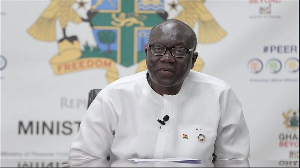Accra, Oct. 16, GNA - Two Defence Counsel in the Ghana Rubber Estates Limited (GREL) divestiture case on Thursday asked an Accra Fast Track Court trying four persons, to acquit and discharge their clients. Making their submissions of "no case" against their clients at the Court's resumed sitting after the long Legal Vacation, Counsel told the court that at the end of its case, the Prosecution had failed to establish any "prima facie" case against their clients that warranted them to open their defence.
The Counsel submitted, therefore, that their clients be acquitted and discharged for lack of evidence.
The two lawyers are Mr David Lamptey and Mr J. E. Senoo, representing Hanny Sherry Ayittey, Treasurer of the 31st December Women's Movement and Emmanuel Amuzu Agbodo, former Executive Secretary of the Divestiture Implementation Committee, respectively.
The two have been jointly charged with Ralph Casely-Hayford, Businessman, and Sati Dorcas Ocran, Housewife, for their involvement in corrupt practices leading to the privatisation of GREL. The four persons allegedly used their positions to influence GREL's divestiture in favour of a French company called Societe Industrielle Plantation Hevea (SIPH).
They have all denied their various charges, and the Court presided over by Mr Justice J. C. Amonoo-Monney, Appeal Court Judge with an additional responsibility on the case as a High Court Judge, had granted each of them a self-recognisance bail.
Mr Lamptey submitted that since the trial was a summary one, the Trial Judge dealing with facts and law, ought to take into consideration the credibility of the evidence of Prosecution Witnesses.
Counsel submitted that at the end of its case, the Prosecution had not been able to prove beyond reasonable doubt the charge preferred against his client.
He, therefore, prayed the court to acquit and discharge her for lack of evidence.
When Mr Senoo took his turn, he submitted that the charge against his client, that is, corruption by public officer, was defective. Counsel stated that in his view the evidence of all the Prosecution Witnesses had not established the essential ingredients of the offence of corruption against his client.
Counsel submitted that there was no evidence to show that in the performance of his duty, his client accepted gifts and consequently used his position to influence the divestiture of GREL.
Concluding, Mr Senoo submitted that the Prosecution had woefully failed to lead evidence to support the charge preferred against his client and, therefore, asked the court to acquit and discharge him. Hearing continues on Friday.
Involve communities in poverty reduction programmes-NCCE official Cape Coast, Oct 16, GNA - The Central Regional Director of the National Commission on Civic Education (NCCE) Mr Frank Adoba, on Thursday called for involvement of communities in poverty reduction programmes.
He said efforts to eradicate poverty are being hindered by government policies that seem to alienate communities from policies affecting them.
"The wide communication gap between the communities and the implementing institutions has the tendency of creating passiveness and uncooperative attitudes among communities", he said.
Mr Adoda said this at the launch of the region's public education programme of poverty reduction.
The objective of the programme is to create awareness in the communities to understand, appreciate and support government efforts at reducing poverty.
He suggested that development programmes and interventions meant to improve the lot of the people be planned with them to ensure full patronage.
The Public Affairs Director of the NCCE, Paapa Nketsiah, called on the people of the region to work harder to lift it from its present position.
This, he said, can be achieved if the people abide by regulations governing the poverty reduction strategy and government programmes and policies aimed at reducing poverty in the country.
Mr Benjamin Kwasi, the Principal of the Cape Coast Workers College, said reducing poverty implied reducing marginalization and social exclusion.
''It should be possible for individuals and groups to have the capacity and the willingness to exert influence on existing power structures and forces that perpetuate their social exclusion", he said.
General News of Thursday, 16 October 2003
Source: GNA












